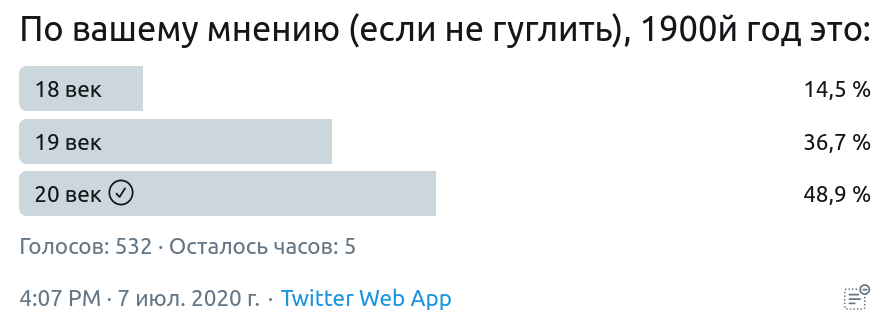
Under this poll, a discussion flared up, which made me first climb into Wikipedia, and then aroused a strong desire to write an article on this topic, since the number of characters on Twitter is not enough to share all the thoughts that I had on this topic. So let's go!
First you need to remember how we count any things that are extended in time or space. We can indicate the number of full segments, or we can indicate the current segment, for example - three hours five minutes or four o'clock in the morning. However, when we write down this information in numerical representation - the fourth hour is always 3 nights, the fifth year of life is 4 years, and your fitness bracelet says that you have run 5 kilometers and 604 meters, and never writes that you are now running the sixth kilometer.
But with regard to dates, everything is different - now is the 2020th year, and in any record it will be designated the same - 2020. Although in fact, only 2019 has passed since the birth of Christ (I deliberately do not introduce amendments between calendars, since in this they do not matter). And this leads to funny incidents. The most famous of them is the answer to the question when the century begins. Since the full 2000 years have passed only at the beginning of 2001, the twenty-first century began with him. The most popular explanation in the examples is “when does a new case of beer start - from the 20th or from the 21st bottle?”. And it seems like this can be finished, but ...
What's wrong with decades? Regardless of the chronology, a decade can begin in any year and end in ten years. But in chronology, named decades are usually used like the 90s, 2000s, etc. These decades include years zero through nine, and, counterintuitively, they have nothing to do with centuries. For example, the 2000s is one year of the twentieth century, and nine years of the twenty-first. At the same time, we can still use the concept of the first decade of the twenty-first century, and it will denote the period from 2001 to 2010.
In the wake of the fact that the "correct" decades in chronology (those into which a century can be divided) begin from the first year, a dispute erupted on Twitter about when the fourth decade begins in a person: some participants argued that, by analogy, full decades - starting from the 31st. Is it logical? No, not at all. I undoubtedly began living my fourth decade from the thirty-first year of life, but from the age of 30. And when I write “31st year” - I mean “thirty-one” and not “thirty-one”. But if we talk about the date, the meaning will change.
So what year was Jesus born? 01-01-01 according to the traditional chronology (remember, we are not going into the details of shifting calendars, this is a separate, extremely interesting topic). Since we count the dates from the Nativity of Christ, he was born on the first day of the first month of the first year. It's funny that the first ten-year period consists of nine years, well, or includes one year BC. However, another point is even more curious - if we search through various biblical sources, we find out that the years of the life of Jesus Christ according to the traditional reckoning are from the 1st to the 33rd. We also know that Jesus lived 33 years. In the second year N.E. Jesus was one year old, in the third - two, in the 33rd ... Thirty-two?
Something doesn't seem to fit. I am not trying to catch the Bible on a mistake, historical reconstructions of real history give less accurate numbers, trying to guess the dates when the events described in the Bible could actually occur. I was interested in another moment here - even when such a way to write down chronology (for the current period, and not for the full past) was invented - errors have already begun to arise due to misunderstanding. Not sure how the years before this period were recorded - perhaps someone in the comments knows this point.
As a programmer, when counting any extended periods, I prefer to start counting from zero, and as a numerical designation, indicate the number of complete completed segments, which is for time, which is for length, and the indication of which segment is now in progress - use in speech or for output as text for greater readability. We are all used to the calendar, and it would be too expensive to change it, but just imagine that the meter ten centimeters is written 2-11. Or 2-2-11 if with decimeters. And on your tape measure, the marks start at one, and on the 101st centimeter the inscription is 2m.
The vote that initiated this article